Maritime Agencies
Lilypond Export Command Is Meeting Expectations, Handles 70% of Nigeria’s Total Tonnage of Export Cargo, says CAC Odusanya.
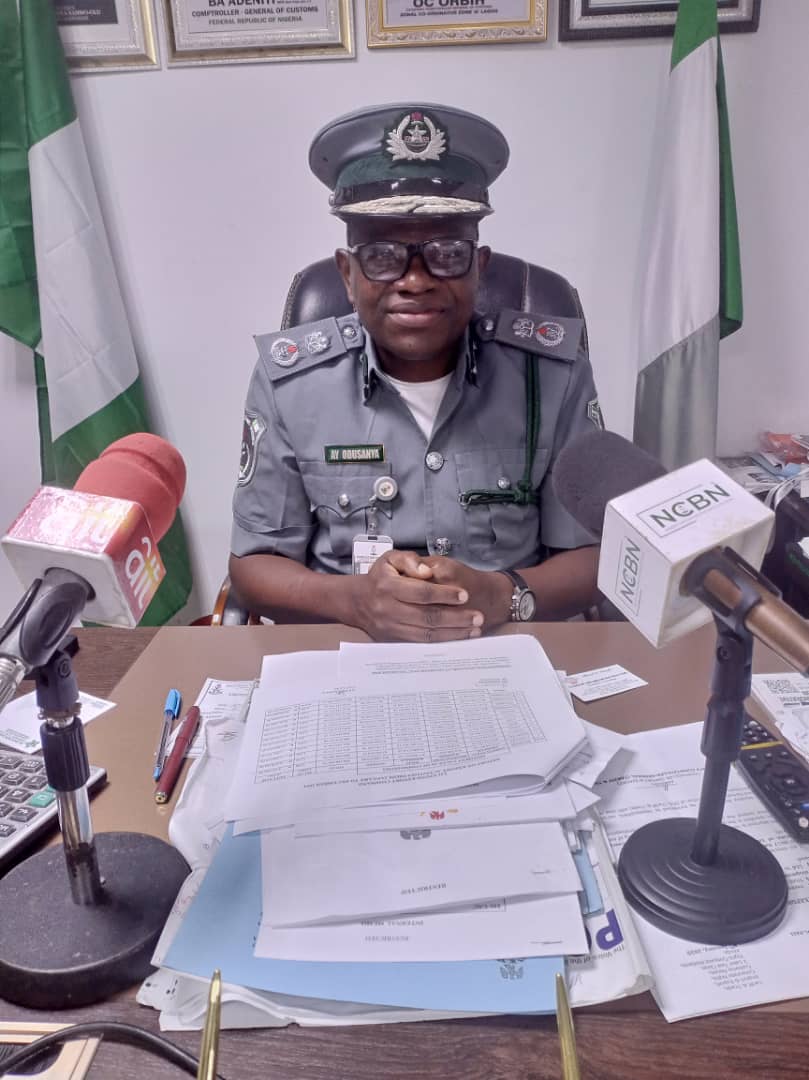
By Izuchukwu Ozoemena
If the South West, especially Lagos, accounts for 70% of Customs duty earnings on exports, it then follows that efforts by Lillypond Export Command in this regard is significant and responsible for such a huge tonnage value of total exports going out of Nigeria.
Customs Area Controller of the Lillypond Export Command, Comptroller Ajibola Odusanya disclosed this during a Roundtable with members of the Maritime Reporters’ Association Of Nigeria, MARAN at the International Press Centre, Apapa.
Insisting that there was no other Export Command in the whole of the South West region, even in the whole Nigeria, he informed that the special Command created in 2022 solely handle export goods is living up to expectations.
“At that period of its creation, although the command was handling only export, the command was not the sole export command at that time. The other commands around the port were still handling part of the export goods around here. We have export seats in Apapa, Tincan, PTML and even Lekki.
“But due to the directive from the government through PEBEC and pressures from other government agencies like the Nigerian Export Promotion Council and the Nigerian Ports Authority, there came a Memorandum of Understanding between the NPA and the customs to streamline all export processes to a command hence the Lillypond Export Command became the sole export command around the South West around July 2024. It was in July 2024 that the command became the only command processing sea bound export around Apapa area.”
He went on to inform that following the successful designation and take off of the Lillypond Export Command as the sole export processing command in Nigeria, other government agencies like the Department of State Services, DSS, Nigeria Drug Law Enforcement Agency, NDLEA, Nigerian Agriculture Quarantine Service among others deployed their officers dedicated to export to the Lillypond Export command.
“Before this arrangement, goods treated by maybe the NDLEA officers at Lillypond, on getting to Apapa or Tincan, you still have another NDLEA officers stopping them. That was the practice before, but with the collapse and also with the synergy that we have with other government agencies, goods treated by any government agency’s official at Lillypond now, no other officer of that particular agency will stop that container on its way to the port.
“Even customs, before the collapse, when export goods treated by Lillypond were moving to the port, Apapa and Tincan Ports export seat officers and their Enforcement Officers will still be stopping those containers either at the gate or inside the port. But now, we don’t have anything like that.
“Export goods treated by Lillypond, given the gate in, given their Eto to enter the port, will only be checked by Lillypond officers at the port gate to confirm that they have been duly treated in the office. And that checking does not mean that they will open the container, unless it is extremely necessary, maybe, based on intelligence. This is because jobs treated in the office are sent to our officers at the port gate online.
“Those coming by water because we have some exports coming by barges into the port too, it is the same process. Just as we have our officers at the gate, we also have our officers at the jetty. So, the place is so sanitized and automated that export goods now move seamlessly into the port either through road or through water”, he explained.
On movement of cargo by rail, the CAC said, “We have goods being moved by rail from outside Lagos to this place. Some come as far as from the North. We have this understanding with the customs commands outside here that goods coming by rail especially those already examined by our colleagues outside Lagos, they have a way of sending a message to us online and from there we do the shipping note and send everything into the port and may be message to the terminal operators, we don’t stop them because they have been examined by those people and they have sent the report to us.
“So, that is the synergy we have with our colleagues especially from the North. We have this understanding with Kano/Kaduna command.”
Maritime Agencies
Shippers’ Council Boss, Akutah, Advocates Stronger Alternative Disputes Resolution, Bags Special Honours from NBA
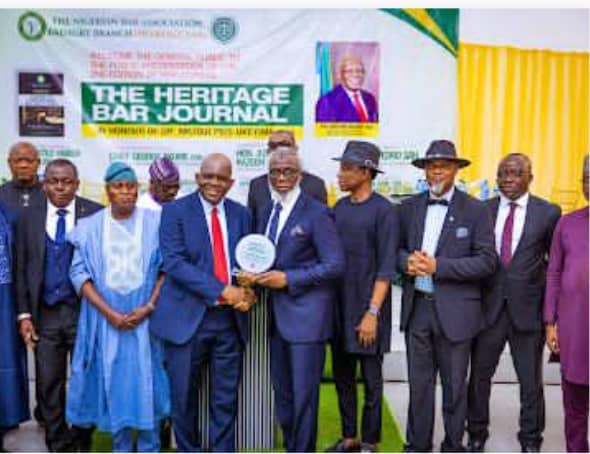
By Izuchukwu Ozoemena
The Executive Secretary/CEO of the Nigerian Shippers’ Council, Dr Pius Ukeyima Akutah has given a guarantee to maritime industry players, particularly shippers, that with a new approach to maritime development being championed by the Council preparatory to the passage of a new ports regulation Act to constitutionally bestow on her the status of the ports economic regulator, a law very important in dealing with all elements of their concerns has been packaged.
Dr Akutah spoke, Thursday, at the sidelines of the 10th Annual Law Week 2025, a colourful event organized by the Nigerian Bar Association, Badagry Branch, at the Gbajabiamila Conference, Centre Lagos State University, Ojo, where he was specially invested as ‘Honorary Life Member of the Heritage Bar’.
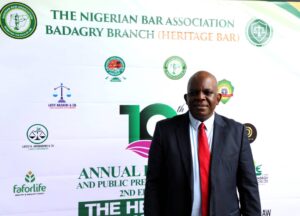
”I guarantee Nigerians and, particularly, the maritime sector players, that that law, when it comes into force, is going to protect their investment; is going to set up the standards that everyone will follow, to provide predictability of investment in the sector. So, investors will no longer be afraid of putting their money in that sector because they will be sure that their money will need investment results and returns. So it’s a law that we are waiting for, and I know that the law is meant for the good of the maritime sector in Nigeria.”
He explained that the 1978 decree, now CAPN 133 of the Nigerian Shippers’ Council Act, is totally a spent law.
“It’s of no use whatsoever in the maritime sector”, he stated.
” We have a new approach to maritime development, and we should have a law that is very important to deal with all the elements that will come up for a regulator like the Nigerian Shippers’ Council.”
”That piece of legislation is very crucial for us to proceed. And I want to thank the Speaker of the House of Representatives, the Senate President for giving attention to that bill when it came before them, and the Minister of Justice for also looking into it. So the two challenges we faced after the bill was passed, those have been cleaned up already, and the bill is back into the National Assembly for a process that will lead to a final assent by Mr. President .
Reacting to suggestions on the need for alternative disputes resolution in maritime matters, Akutah, a lawyer and technocrat of high repute, advocated that the mechanism be made very effective and efficient in tackling maritime disputes.
”Over the years, this has been advocated but not so much has been done yet. But a lot is going on. Even in the court reforms, we have the Admiralty jurisdiction of the Federal High Court which fast-tracks these processes. But yet again, because of certain unforeseen factors in the administration of justice, sometimes those delays are imminent and you can’t help it. But then the issue of alternative dispute resolution mechanisms is very crucial.
He recalled handling the case of a vessel, ‘Heroic Idiom’ as a prosecutor at the Federal Ministry of Justice, securing an out-of-court dispute resolution before being seconded to the Nigerian Shippers Council as Executive Secretary. The vessel, he explained, was accosted in Equatorial Guinea and brought back to Nigeria.
”I was a prosecutor in the case at that time before I left the Ministry of Justice. And then, if I must say, there are some other reforms going on in the Nigerian Shippers Council today. One major reform is in the area of law reform.”
He explained that at the Nigerian Shippers Council, there is a unit that is dedicated to handling maritime disputes.
”I will say that last year alone, that unit was able to resolve cases that would have cost over 6 billion in legal fees and damages and delays and all of that in maritime disputes. So we are doing everything possible to ensure that that mechanism is promoted over and against court resolution of matters so that before any case can go to court, let’s try arbitration. Let’s try any other alternative dispute resolution mechanism that are available to us in the sector..”
”Even in the Ministry of Justice where I was a prosecutor, certain cases were resolved without necessarily going to court. The courts are there. They are actually the last resort.
”When all resolution mechanisms fail, then you can approach the courts because they are statutory institutions to resolve disputes. But that doesn’t mean that individuals cannot resolve disputes by themselves, especially commercial disputes where money is involved, investments are involved in it.
So if you tie down your investments for 10 years, pursuing a legal battle in court, by the time you come back that investment has been dissipated to almost nothing. So we encourage alternative dispute resolution mechanisms to be applied first in handling maritime disputes. Majority of them are commercial disputes, not criminal cases, so to say.
Even in criminal cases, there is room for parties to settle, especially, like I said, where there is a commercial element in it and money is involved. If the parties have agreed to sort out their differences, why do you proceed to court? So this is very important.
Maritime Agencies
MMA Customs Command Hits 100.1% of Annual Revenue Target 11 Months Before Year-End.

By Izuchukwu Ozoemena
The Murtala Mohammed Airport Command of the Nigeria Customs Service, Wednesday, said that in eleven months, the Command has already achieved 100.1%, surpassing her annual revenue target for 2025. Customs Area Controller, Comptroller M.T. Awe disclosed this in Ikeja, Lagos, while highlighting the Command’s activities as well as accomplishments in its core responsibilities of revenue generation, trade facilitation and suppression of smuggling as the year ends.
Between January and November 2025, the Command generated a total of N179, 910, 971.00 from customs duties and related charges.
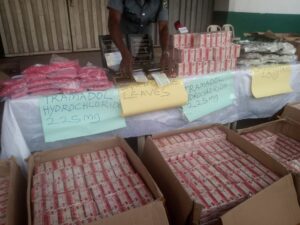
The seized contrabands on display.
” The revenue generated shows a significant improvement over N164, 819, 895, 457:00 that was generated in the corresponding period in 2024. This reflects an outstanding 9.16% increase, amounting to N15, 91, 75, 645: 81 kobo growth.”
”The Command’s exceptional performance within this period,” the CAC explained, “is attributed to the dedication of our personnel, strong collaboration with partner agencies, and continuous engagement with stakeholders.”
”This impressive performance reflects our unwavering commitment to efficiency, transparency and accountability. Our success is driven by enhanced trader compliance, timely monitoring of import transactions, swift detection of irregularities, and deliberate actions taken to eliminate all revenue leakages.”
He extended his heartfelt appreciation to all compliant traders and clearing agents for being cooperative and dedicated.
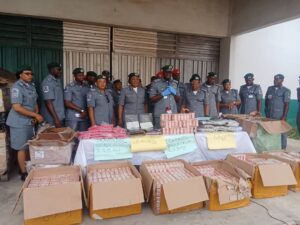
On anti-smuggling operations, during this period, the Command successfully intercepted and seized the following prohibited items:3pkgs of Colorado CAT Leaf4pkgs of Nigeria Immigration Service uniform materials, 1pkg Two-way Radio Walkie Talkie and 1pkg of TIPPMANN Semi-Automatic 50/68 Calibre Magfed Paintball marker gun. Others were 75pkgs of Pangolin Scales , 1pkg of Elephant Tusk, 2pkgs of Canadian Cannabis Sativa, 6pkgs of 225mg Tramadol Hydrochloride and 17pkgs of unregistered 300mg Pregabalin tablets Others were 5pkgs of unregistered 2mg Sardulud and 50mg Norflex tablets, 6pkgs of 225mg Tramadol Hydrochloride and 523pcs of signed Deutsch Bank and AIB Bank Cheques. The total Duty Paid Value of these seizures is N7, 201, 895, 232:00.
The Command was able to achieve this feat through robust intelligence gathering, strengthened surveillance efforts as well as effective collaboration with relevant partners.
”The Command remains firmly committed to its zero-tolerance stance on smuggling and will continue to enforce all applicable trade laws with the highest standards of integrity and professionalism”.
Comptroller Awe espoused the virtues of strong stakeholder relationships and its role in the Command’s achievements.
”Throughout the period under review, we sustained an open communication and mutual cooperation with all stakeholders and sister agencies. These engagements enabled us to resolve challenges amicably, harmonize procedures, and deepen institutional trust.Together, we created a more conducive environment for legitimate trade while maintaining strict and consistent enforcement against all forms of violations.”
He expressed profound gratitude to the Comptroller-General of Customs, Bashir Adewale Adeniyi, MFR, and the entire management team for their visionary leadership and unwavering support.
”Their guidance has been instrumental to every accomplishment we have recorded. I equally extend my heartfelt appreciation to the officers and men of the Command. Your dedication, resilience and professionalism have been the backbone of our success”.
He urged them the personnel to continue upholding the Service’ core values of integrity, discipline, and excellence in service delivery.
”To our stakeholders, I remain deeply grateful for your patience, understanding and cooperation. You have been true partners in progress, and your contributions have strengthened our collective efforts”.
Murtala Muhammed Area Command, he emphasized, remains firmly committed to improving revenue generation, intensifying the fight against smuggling and deepening stakeholder collaboration.
Maritime Agencies
MARAN Dissolves Exco, Appoints An Interim Leadership.
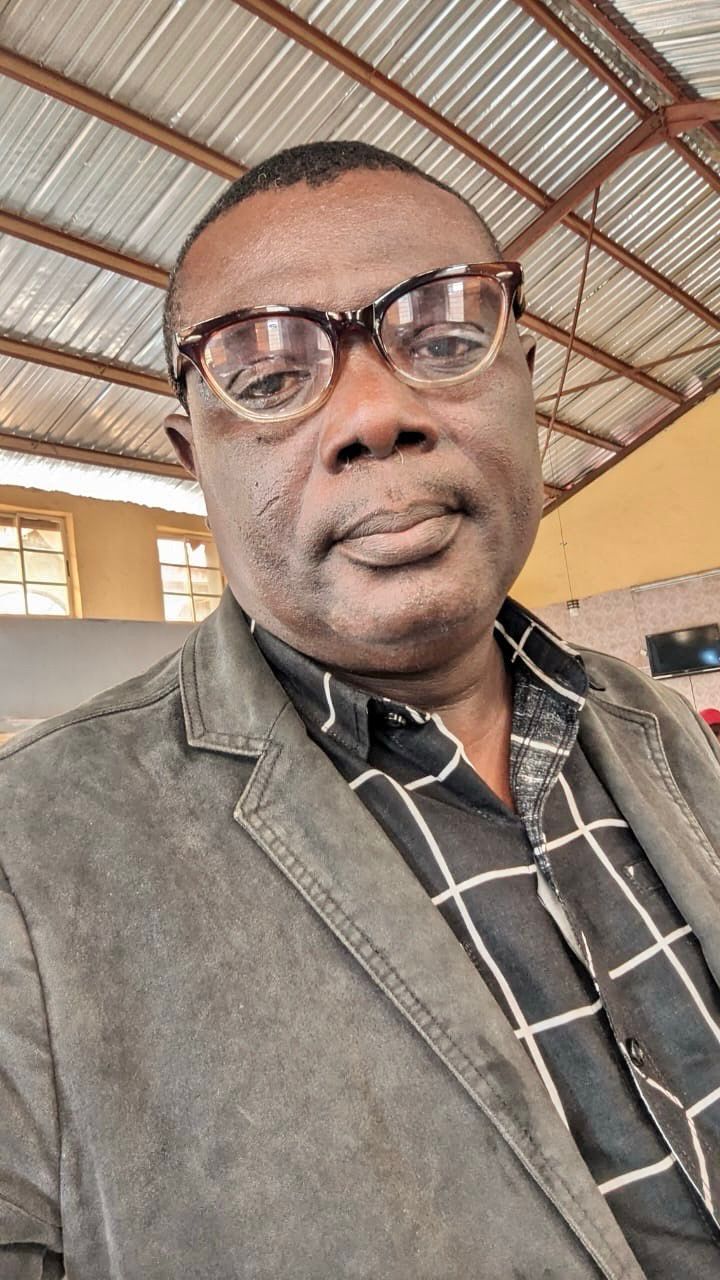
By Izuchukwu Ozoemena
Nigeria’s pioneer maritime reporters body, the Maritime Reporters Association of Nigeria (MARAN), Thursday, set aside the Godfrey Bivbere-led Executive, replacing it with a 3-man Caretaker Committee to run the affairs of the body in the interim.
The Caretaker Committee unanimously put in place is part of a major reorganization to reposition MARAN to enable her meet her cardinal aspirations .
Led by Mr Tunde Ayodele as Chairman, Mr John Obot and Mrs Ruth Sunday Umunna now serve as Secretary and Treasurer respectively.
Unveiling the new dispensation in a release, MARAN wishes all stakeholders, particularly in the maritime sector, ministries, government departments and agencies to, henceforth, direct and channel all dealings with the new leadership.
”The Association wishes to state categorically that the action is for the good of the Association, the industry and the nation in general and should therefore not be misconstrued.”
”We wish to use this medium to invite our highly esteemed stakeholders to our Association’s forthcoming launch of the book, “50 Drivers of the Nigerian Marine and Blue Economy”, coming up on the 4th of December, at Providence Hotel, GRA, Ikeja, Lagos.”
”The Maritime Reporters Association of Nigeria, MARAN, is a foremost body of highly cerebral, credible, erudite and professional Journalists, registered with the Corporate Affairs Commission. It has been covering the activities of the maritime industry for nearly four decades.”
”The Association had made its indelible mark in the maritime sector through unbiased, insightful, and impactful reportage of the sector over the years.
It is the first and the longest Maritime Association in the Industry and has evolved with more than forty members from the Prints, Electronic and Online platforms.”
-
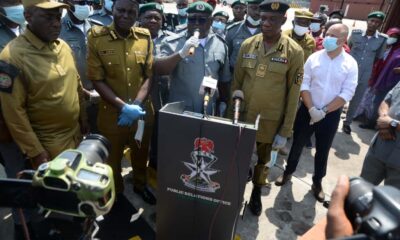
 Maritime Agencies2 weeks ago
Maritime Agencies2 weeks agoPTML Customs Intercepts 1000kg of Cocaine In Empty Container
-
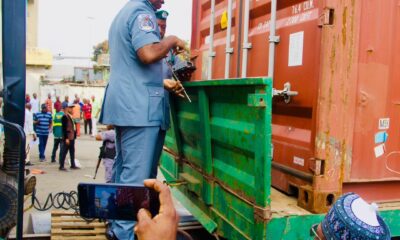
 Maritime Agencies3 weeks ago
Maritime Agencies3 weeks agoApapa Customs Unveils ECTS To Deepen Trade Facilitation, Boost Revenue And National Security.I
-

 Maritime Agencies1 week ago
Maritime Agencies1 week agoIMPRESSIVE REVENUE DRIVE: Tincan Customs Generates ₦154.3Bn In October.
-

 Maritime Agencies2 weeks ago
Maritime Agencies2 weeks agoMAN: Only A NASS Review Can Convert It To A Conventional University, Governing Council Warns.
-
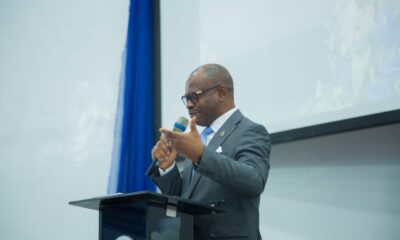
 Maritime Agencies2 weeks ago
Maritime Agencies2 weeks agoMAN, ORON, Charges Graduating Cadets To Uphold Academy’s Core Values.
-

 Maritime Agencies2 weeks ago
Maritime Agencies2 weeks agoMAN, ORON: Minister, Governing Council, Celebrate Management and Cadets At 2025 Graduation Event
-
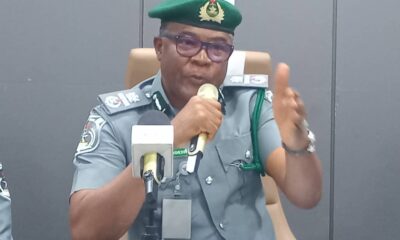
 Maritime Agencies2 weeks ago
Maritime Agencies2 weeks agoCustoms Embraces OSS, A Special Platform, To Deepen Trade Facilitation
-

 Maritime Agencies1 week ago
Maritime Agencies1 week agoOyetola, Iheanacho, To Lead Maritime Stakeholders To Launch MARAN’s New Book



























